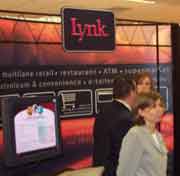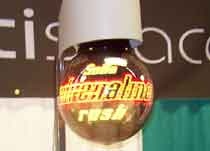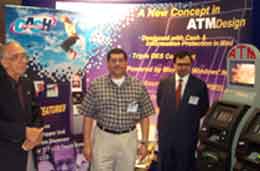News
Making the scene in Miami, part II
More of our editor's impressions from last week's 'ATMs in the Americas,' a Miami conference co-sponsored by the ATM Industry Association and NYCE Corporation.
March 20, 2003
Because there was so much activity at last week's "ATMs in the Americas" conference in Miami, co-sponsored by the ATM Industry Association and NYCE Corporation, it was too much of a challenge for this editor to include all of the interesting things she saw and heard in a single article.
So, a show wrap-up can be found in not one, but two, parts on this site. Read Part I of the Miami review, then read on for some additional impressions:
Latin opportunities: Jorge Fernandez, president and chief executive of Capture Systems, LLC, a Coral Gables, Fla.-based company that has deployed more than 1,000 retail ATMs throughout Latin America, said that the region -- with a current installed base of only about 4,000 ATMs -- presents a tremendous opportunity for independent deployers. He believes the markets with the biggest potential are: Mexico, with a possible 15,000 sites; Brazil, with 20,000; the Caribbean, with 5,000; and Central American countries such as Costa Rica, with 2,000.
 |
Lynk Systems account executive Katie Lefebvre gets ready to run a demo of DataLynk, the processor's new real-time reporting system. |
And challenges: Among the biggest challenges, Fernandez said, are banks that fear and oppose independent deployers, a lack of surcharging (offset in some cases by high transaction volumes and/or attractive interchange rates) and a retail community unfamiliar with the off-site ATM concept. He said, "When we go to sell retailers on the program, after the initial 'wow factor,' their next question is 'Is this legal?'"
Canadian crackdown: Fred Harris, senior vice president of Canada's Interac Association, which runs the country's shared ATM and debit networks, said Interac plans to introduce a compliance program designed to reduce card fraud later this year. A key part of the program will be monetary sanctions for violators. "I'm not sure that just issuing best practices is effective (at deterring fraud)," Harris said. "I believe the more you can put in regulations, the better the implementation will be."
Off the top: Skimming is a growing problem at Canadian ATMs, Harris said, mentioning a high-profile case in which five retail ATMs in Vancouver were used to obtain PINs and other information needed to produce bogus bankcards. According to published reports, two women who were arrested with $280,000 (about $184,447 U.S.) were sentenced to 20 months in prison after pleading guilty to fraud charges in January. Authorities believe several others are involved, and that losses could amount to as much as $5 million ($3.2 million U.S.)
It's a small world…: At least where transactions are concerned. Kent Phillips, vice president of business development for Transaction Network Services' Point of Service division, said that TNS essentially uses "a very big LAN (local area network) that circles the globe" to serve customers like USA Payment Systems, a Texas company that processes transactions originating in UK casinos for ATM deployer Global Cash Access. The transactions cross the Atlantic several times. TNS routes them from its data center in the UK to its U.S. data center in Reston, Va., on to First Payment Systems, then to the UK's Barclays Bank for authorization, and back to First Payment Systems, which sends the appropriate message to the ATM in London to dispense cash.
To make it even more interesting: TNS translates the messages from the Visa II protocol, to X.25, to TCP/IP.
No accent, mate: The lack of an Aussie accent -- not to mention a decidedly feminine mystique -- tipped attendees that Anita Nobles Arguelles, Triton's manager of marketing and product management, was a last-minute substitute on the speaker's podium for Jeff Barrow, the manufacturer's VP of sales and marketing. Barrow was detained by fog in Long Beach, Miss., so could not speak on value-added services at the ATM.
Bundle up: Arguelles explained that Triton had conducted extensive market research before selecting the first three applications -- prepaid phone top-ups, check cashing and money transfer -- for its Waves program, which utilizes bundled software to add new transactions to the ATM. Bundling the software allows merchants to choose "what, when and where" they want to add, she said.
 |
A New York company called Optispace exhibited yet another twist on ATM advertising, a groovy-looking globe it calls the iBall. |
Panama overview: Orlando Garcia, the chief executive of Panama's Telerednetwork, said his network handled 18 million transactions in 2002, up 12 percent from the previous year. Panama has 390 ATMs, doing an average of 3,000 transactions a month.
Panama preview: Future projects on tap for Telered include developing a disaster recovery area; converting its communication network to TCP/IP; upgrading to handle pending Triple DES and chip requirements; developing an electronic bill presentment and payment system that Garcia said would utilize a combination of the Internet, ATM and ACH networks; and developing a system in which checks could be pre-authorized at the point-of-sale.
Different strokes: Marilyn Kilcrease, president of Creative Card Solutions, a California company that helps financial institutions develop and manage ISO sponsorship programs, said that existing card association regulations designed to deter fraud were created for the merchant credit card processing market, which is a different animal from the ATM business. "The regulators don't really understand the merchant ATM market," she said.
Urge overkill: The card associations have asked sponsor banks to in a short time go from "doing a cursory due diligence and sign-off of their ISOs to knowing the manufacturer and ID number of each ATM they sponsor," Kilcrease said. "Rather than pinpointing specific areas of risk, (sponsor banks) are being asked to address the entire (fraud) issue." She suggested that networks and processors could share more responsibility. For instance, she said, banks are being asked to visit each ATM site to verify information that could easily be obtained from processors.
Got the time?: Robert Malik, senior VP of Efmark Service Company, said that while response time is a key part of nearly every service contract, it shouldn't be the primary focus. "If you can meet the response time but then you're not able to solve the problem, the customer is not going to be happy." More emphasis should be placed on uptime instead, he said.
Got it covered: Using a single provider, who can provide both first- and second-line service, provides an opportunity to reduce cost for deployers who view their ATM networks from a total cost of ownership perspective, Malik said. "If you send a second-line tech to resolve a problem rather than a first-line tech to try to solve a problem, you're going to experience increases in uptime."
Face off: Chris Klein, executive VP of marketing for Mosaic Software, which provides its Postilion transaction processing software for 7-Eleven's Vcom program, said that users would never guess that the Vcom uses a Microsoft Windows 2000-based browser, as the interface isn't markedly different from many ATMs. "Even though it uses a browser, it's not a browser-looking interface," he said.
Really real time: Jonathan Johnson, VP of International Merchant Services, the Texas ISO that beta tested Lynk Systems' DataLynk, sang the praises of the new system, which offers real-time terminal status messages, transaction and terminal management data. It gives him more control, Johnson said. "It's put on my server just as if I was sitting at Lynk. I'm not forced to look at it the way somebody else wants me to see it. Instead of sending my customers to a processor's Web site, I can put the data on my site and direct them there."
Border patrol: Tony Park, chief financial officer of NexTran Industries, said that NexTran, which entered the U.S. market last year, has signed about 30 distributors so far, with about half of them actively selling ATMs. NexTran plans to limit the number of distributors, giving each an exclusive territory. So far, the strategy seems popular among ISOs, Park said, though a few have paid a $300 penalty for selling outside their territories.
 |
A crew from Compact Cash showed the entry-level ATM market's newest entry, a machine priced under $3,000 wholesale. |
Report card: John Clatworthy, VP of sales and marketing for vault cash provider Cash Connect, said his company offers a performance report that helps its customers evaluate their cash management programs. The reports help Cash Connect clients maintain the desired residual cash levels in their ATMs, Clatworthy said.
New, shmew: Michael Hamm, VP of sales for Atlanta Computer Group, said his company has discovered a thriving market among ISOs for refurbished kiosk enclosures for exterior ATMs. Hamm just sold a seven-by-seven-foot kiosk with heating, air conditioning and other amenities to an ISO that used it to deploy two small through-the-wall machines side-by-side in an Oregon parking lot. The price: $5,500, less than half the cost of a "new" enclosure.
Makes the ads go 'round: Kevin Ryan, chief executive of Optispace, attended the show to gauge industry reaction to his company's iBall, a globe made of tough polycarbonate that can be mounted atop an ATM. It's filled with rotating color LEDs, and has been popular with advertisers like Frito-Lay when deployed at Atlantic City casinos and on lottery terminals in New York and Philadelphia. Ryan is planning a three-month ATM pilot with eight advertisers, some local and some national, at convenience stores in the Philadelphia market.
New kid on the playground: A Lakeland, Fla. company called Compact Cash is introducing a new machine it calls .NetATM. It's based on a Microsoft Windows CE operating system that Badr Refae, Compact Cash president, said offers "advanced technology at an affordable price." How affordable? Under $3,000 wholesale. While Refae thinks the industry has neared the bottom on entry-level ATM pricing, he believes it could go 10 percent to 15 percent lower. Ouch.
Included In This Story
Cash Connect
Cash Connect is the nation's premier and longest standing vault cash and logistics provider to the ATM industry and now allows you to generate growing new revenue streams with Smart Safes, Recyclers and Kiosks.
Triton Systems
Triton FI based products • NO Windows 10™ Upgrade • Secured locked down system that is virus/malware resistant • Flexible configurations - Drive-up and Walk-up • Triton's high security standards • NFC, anti-skim card reader, IP camera and level 1 vaults are all options • Triton Connect monitoring • Lower cost
 ChatGPT
ChatGPT Grok
Grok Perplexity
Perplexity Claude
Claude












